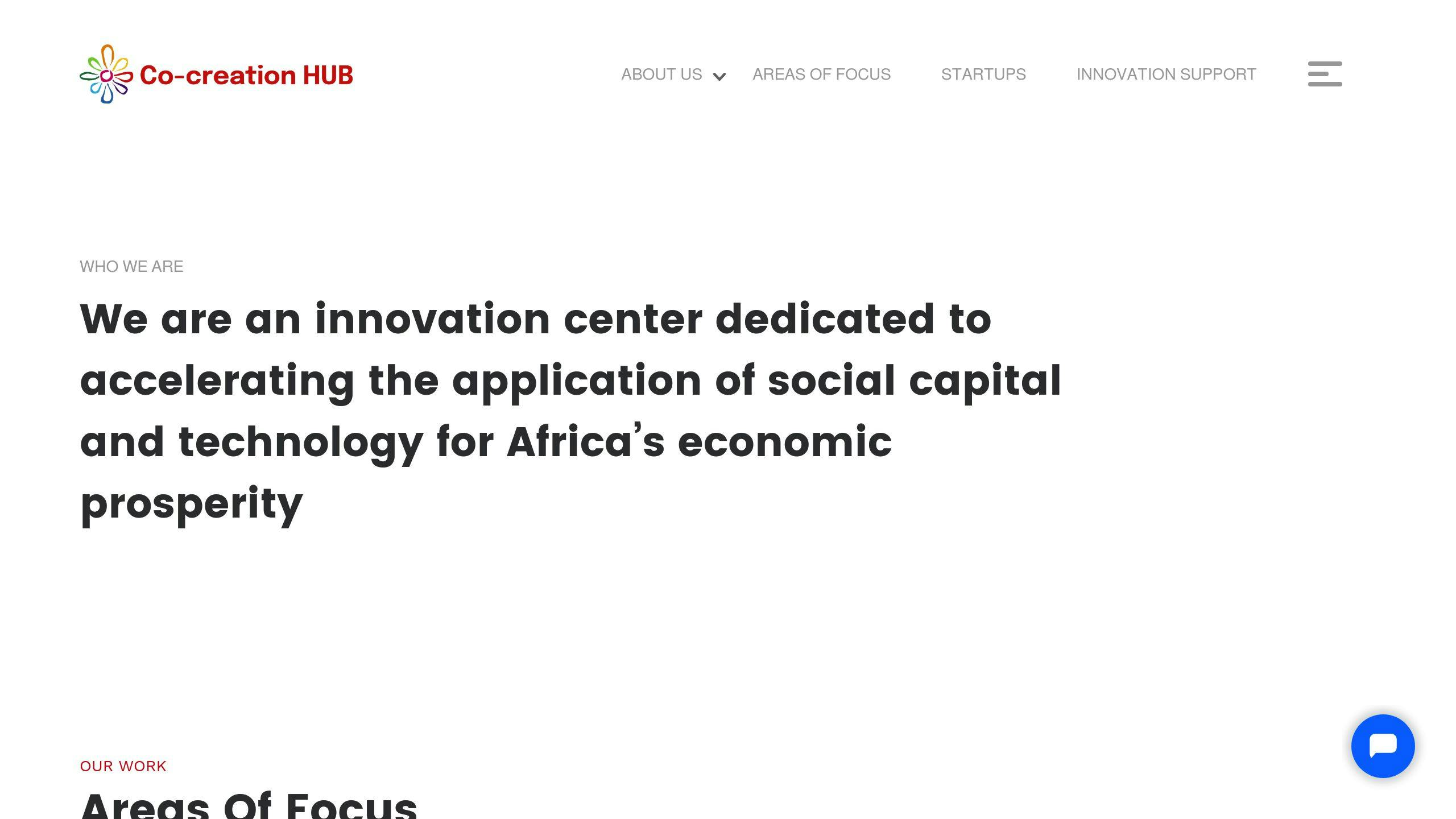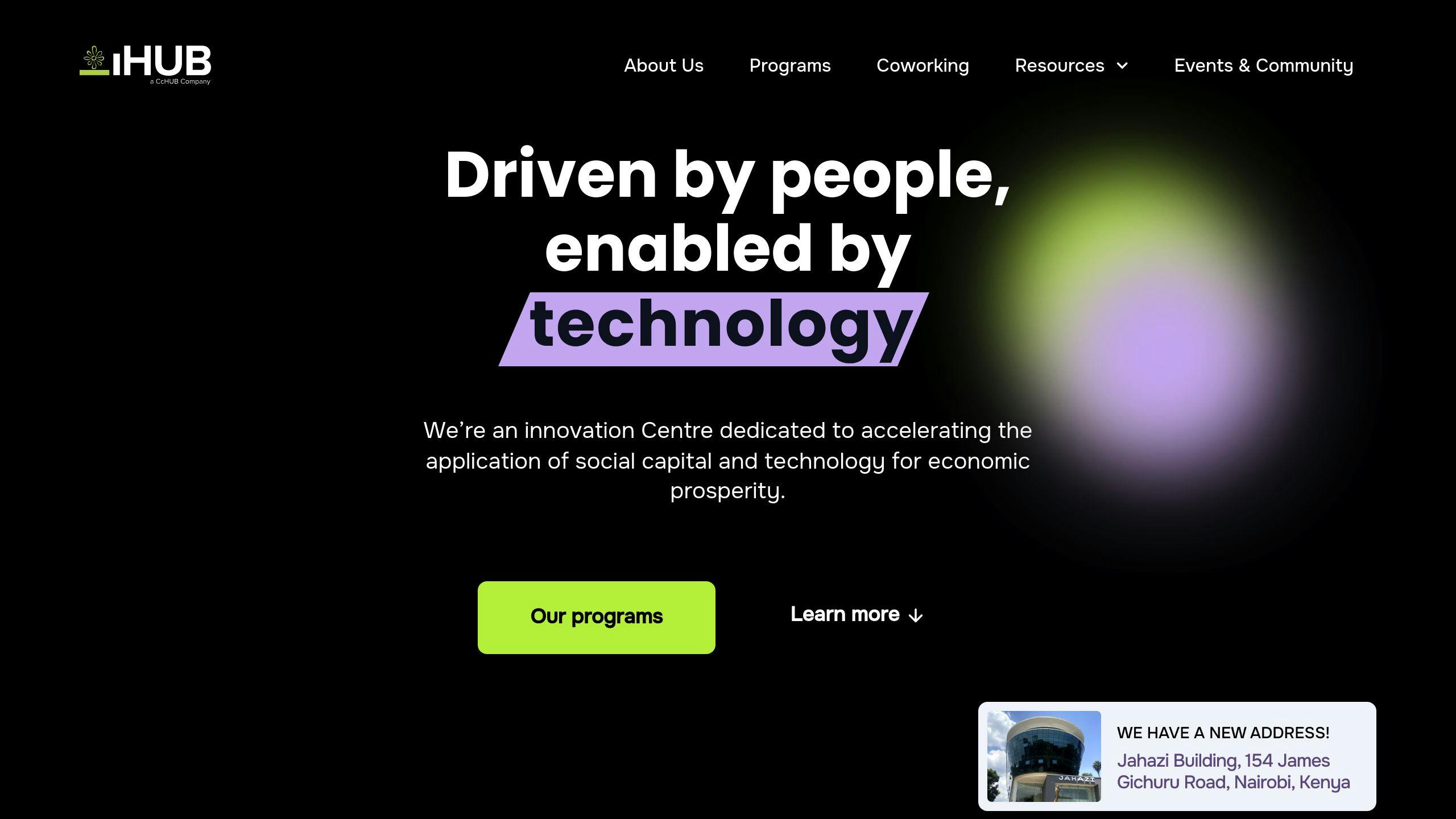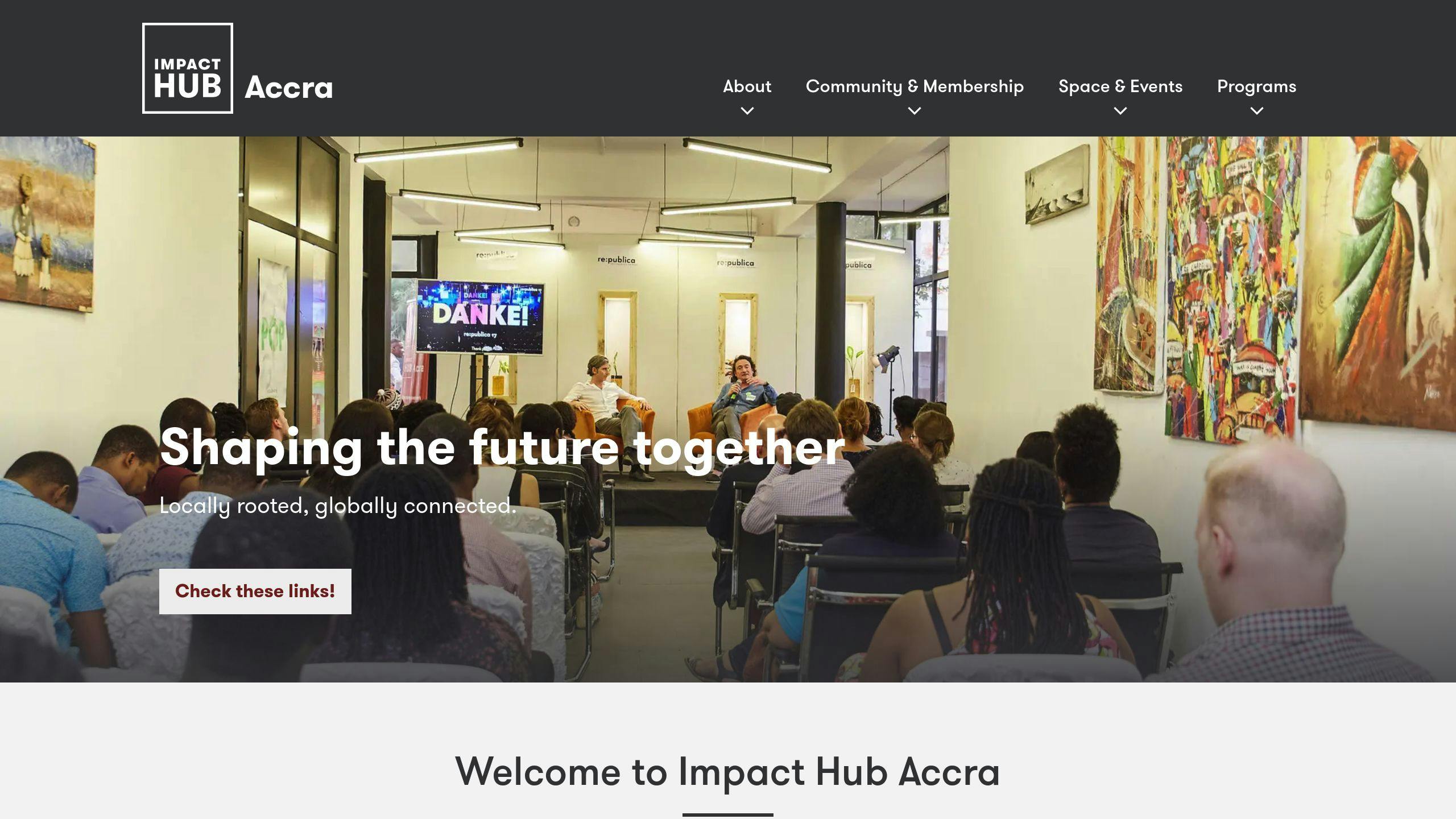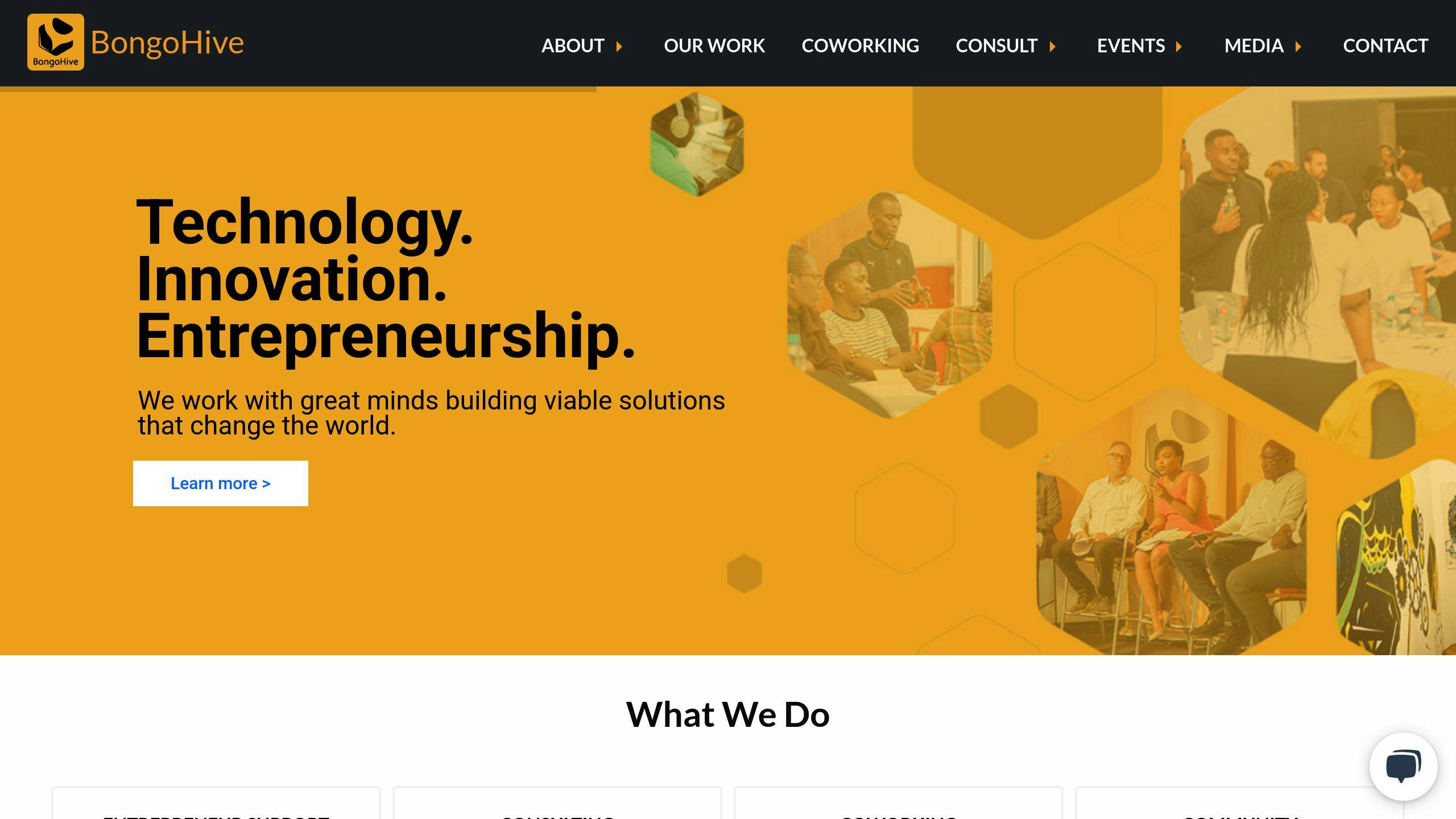Africa is home to over 618 active tech hubs, driving innovation, entrepreneurship, and job creation across the continent. These hubs provide startups with essential resources like funding, training, and networking opportunities to solve local challenges while connecting to global markets. Here’s a quick look at 7 standout hubs making a difference:
- Co-Creation Hub (Nigeria): Focuses on tech training, job creation, and gender inclusion.
- iHub (Kenya): Supports startups like M-KOPA Solar and Ushahidi with funding and mentorship.
- Silicon Cape Initiative (South Africa): Connects over 10,000 stakeholders to grow the Western Cape’s tech ecosystem.
- Impact Hub Accra (Ghana): Promotes social entrepreneurship and aligns with development goals.
- Nairobi Garage (Kenya): Offers shared workspaces and networking across four locations.
- On Sloane (South Africa): Africa’s largest startup campus, providing mentorship and funding access.
- BongoHive (Zambia): Focuses on startup development and skills training in Lusaka.
These hubs are reshaping Africa’s startup scene by addressing youth unemployment, fostering collaboration, and scaling local solutions globally.
Transforming Africa’s Startup Ecosystem
1. Co-Creation Hub (Nigeria)

Launched in 2010, Co-Creation Hub (CcHUB) is Nigeria’s first open living lab and pre-incubation space, designed to nurture tech talent and entrepreneurship [3]. It offers incubation programs, acceleration services, and funding opportunities, creating a thriving environment for startups to grow.
CcHUB addresses unemployment with a strong focus on including women, aiming for 50% female participation in its initiatives. Working with CFYE, the hub has supported 18 startups, generated 240 jobs, and bridged Africa’s tech skills gap through hands-on training and job placement programs [1].
Its work centers on three main goals: developing skills to benefit 1,560 individuals, creating 240 new jobs, and ensuring gender balance by targeting equal participation of women [1]. By connecting entrepreneurs, technologists, and investors, CcHUB builds a network that strengthens Nigeria’s tech ecosystem.
More than just a workspace, CcHUB serves as a collaborative meeting point for innovators. Through its efforts in Lagos and beyond, the hub leverages technology and networks to boost economic growth and foster community [1][3].
The hub’s achievements showcase how tech hubs can contribute to national development. Up next is Kenya’s iHub, a leader in East Africa’s innovation scene.
2. iHub (Kenya)

iHub supports tech entrepreneurs through a mix of incubation, acceleration, and funding programs, offering a space where startups can grow and succeed.
Some standout alumni include M-KOPA Solar, which revolutionized solar energy access in East Africa, and Ushahidi, a globally recognized crowdsourcing platform. These examples highlight iHub’s role in helping startups grow from early ideas into market leaders.
The hub promotes collaboration by offering co-working spaces, targeted training, and research services. Startups gain technical skills and market knowledge, while partnerships with governments, corporations, and universities ensure access to a wide range of resources and expertise.
To track its impact, iHub focuses on metrics like startup growth, job creation, and community engagement. It connects entrepreneurs with mentors and investors, giving startups opportunities to pitch ideas and secure funding.
iHub has shown how local solutions can achieve global reach, with Ushahidi being a prime example of its influence. From Kenya’s iHub, we now turn to South Africa’s Silicon Cape Initiative, which drives innovation through its extensive network of stakeholders.
3. Silicon Cape Initiative (South Africa)
![]()
Launched in 2009, the Silicon Cape Initiative stands out as a key player in South Africa’s tech scene, focusing on the Western Cape region. Its mission? To create an environment that attracts and nurtures tech talent.
With a community of over 10,000 members – including entrepreneurs, investors, and government representatives – Silicon Cape fosters collaboration to drive advancements in the tech ecosystem of the Western Cape [2].
The initiative operates with two main goals:
- Connecting startups with investors, mentors, and shared resources through events and strategic partnerships.
- Building local tech talent to support the growth of startups in the region.
What sets Silicon Cape apart is its open framework, allowing global users to tap into its networking platform and resources [2]. This inclusive approach has paved the way for both emerging IP startups and established tech companies to thrive.
Silicon Cape also plays a crucial role in bridging gaps between various stakeholders, solidifying the Western Cape’s reputation as a tech innovation hub [2]. Next, we’ll look at Impact Hub Accra in Ghana, which showcases how innovation hubs can empower local communities while tackling regional challenges.
4. Impact Hub Accra (Ghana)

Impact Hub Accra plays a key role in Ghana’s entrepreneurial scene, providing a space where innovators can create real change. As part of the global Impact Hub network, it supports growth in West Africa by focusing on development and technology.
The hub supports startups with incubation programs, networking opportunities, and access to essential resources like co-working spaces, research tools, and investor connections. It stands out for its focus on social entrepreneurship and its work aligned with development goals in areas such as renewable energy and e-commerce.
Impact Hub Accra operates through three core areas:
- Step-by-Step Support: Entrepreneurs receive mentorship, technical training, and funding opportunities to help turn ideas into market-ready businesses.
- Community Building: Events and collaborative sessions connect entrepreneurs with investors and industry experts, strengthening Ghana’s tech ecosystem.
- Strategic Partnerships: Collaborations with governments and corporations expand the hub’s reach, driving innovation across the region.
By hosting events and forming partnerships, Impact Hub Accra has built a thriving community that helps entrepreneurs tackle local challenges. Its dedication to social entrepreneurship makes it a driving force for change in Ghana’s tech sector.
While Impact Hub Accra focuses on social entrepreneurship and development in Ghana, Nairobi Garage offers a different model for innovation and collaboration in Kenya.
sbb-itb-dd089af
5. Nairobi Garage (Kenya)

Launched in 2014, Nairobi Garage has grown into one of Kenya’s leading tech hubs, offering fully serviced shared office spaces. It plays a key role in Kenya’s tech scene, providing 24/7 access to workspaces tailored for businesses at all stages, from startups to established enterprises.
What sets Nairobi Garage apart is its strong support system and a vibrant community of over 200 member businesses. The hub fosters connections and growth through:
- Collaborative workspaces designed to encourage interaction and idea sharing
- Events and networking opportunities that link entrepreneurs with investors and industry leaders
- Shared resources that help startups cut operational costs
| Location | Focus Area | Highlights |
|---|---|---|
| Kilimani | Tech Startups | Easy access to the Central Business District |
| Karen | Creative Industries | Quiet and inspiring workspaces |
| Spring Valley | Financial Tech | Top-tier facilities |
| Westlands | Corporate Innovation | Strong enterprise connections |
With four locations across Nairobi, the hub has created innovation clusters that strengthen the city’s reputation as East Africa’s tech powerhouse. Facilities include high-speed internet and modern offices tailored for tech-driven businesses.
Nairobi Garage has gone beyond simply providing office space. Its multi-location model builds interconnected communities, making it a vital part of Nairobi’s innovation ecosystem.
Next, we’ll explore On Sloane in South Africa, a hub fueling entrepreneurship across the continent.
6. On Sloane (South Africa)
On Sloane, located in Johannesburg, is South Africa’s largest startup campus. It offers a vibrant space for entrepreneurs to grow their ideas and scale their businesses. The campus is designed to rival global tech districts, creating an environment where startups and established companies work side by side.
With modern infrastructure and co-working spaces, On Sloane encourages collaboration and creativity. Startups here benefit from a strong support system, including access to seasoned mentors who guide them on strategies for business growth, market entry, and scaling.
| Resource Type | Offering | Impact |
|---|---|---|
| Workspace | Co-working spaces and private offices | Promotes collaboration and creativity |
| Network Access | Connections to mentors and investors | Boosts business development |
| Community Support | Events and programs | Strengthens entrepreneurial networks |
| Infrastructure | Advanced facilities | Streamlines operations |
On Sloane also hosts frequent networking events and builds partnerships across Africa, creating a startup network that extends far beyond Johannesburg. As part of a broader network of tech hubs across the continent, it plays a key role in driving innovation in Africa [3].
The campus emphasizes knowledge sharing through:
- Mentorship Programs: Linking startups with experienced industry leaders.
- Investment Networks: Opening doors to funding opportunities.
On Sloane has positioned Johannesburg as a major hub in Africa’s growing tech ecosystem. By offering vital resources and fostering a supportive community, it continues to shape the future of African entrepreneurship.
Next, we’ll explore The BongoHive Tech and Innovation Hub in Zambia, which approaches entrepreneurship with its own unique methods.
7. The BongoHive Tech and Innovation Hub (Zambia)

The BongoHive Tech and Innovation Hub is a leading center for technology and entrepreneurship in Zambia, playing a key role in boosting Lusaka’s tech ecosystem. As a major player in Zambia’s startup scene, BongoHive provides a range of support systems tailored to the needs of local entrepreneurs.
The hub focuses on three main areas to build a stronger community:
| Focus Area | Services Provided | Impact on Community |
|---|---|---|
| Startup Development | Incubation programs, mentorship | Supports early-stage businesses |
| Skills & Resources | Training, workshops, co-working spaces, networking events | Develops talent and promotes collaboration |
BongoHive’s efforts go beyond offering a physical space. Through strategic partnerships, it connects Zambian startups with resources across Africa, giving local entrepreneurs the tools they need to grow.
What makes BongoHive stand out is its role within the African Tech Hubs Network. This network links Zambian startups to opportunities across the continent, helping them expand their reach and scale their solutions internationally.
The hub tackles critical challenges in Zambia’s startup ecosystem by offering:
- Focused Mentorship: Industry-specific advice from experienced professionals
- Access to Resources: Tools and technologies that support business growth
- Community Engagement: Meetups and knowledge-sharing events to foster collaboration
BongoHive serves as a model for how regional hubs can encourage innovation while staying connected to Africa’s larger tech landscape. Its achievements in Zambia highlight valuable approaches for other emerging tech hubs, especially in areas where startup support systems are still evolving.
Conclusion
Africa’s startup scene is thriving, thanks to the collaborative efforts and targeted support provided by its innovation hubs. These centers play a key role in driving change by offering strong support systems and building connected communities.
Through carefully designed programs, these hubs have laid a solid groundwork for entrepreneurial success, showcasing their impact on local economies. Each of the seven hubs highlights how blending local solutions with global partnerships can fuel entrepreneurship across the continent.
Here’s where these hubs shine:
- Training and skill-building: Offering coding bootcamps and other educational programs.
- Access to resources: Providing incubation services and funding opportunities.
- Building networks: Creating partnerships that span across borders.
These hubs address the specific challenges African startups face by offering tailored support for local entrepreneurs while maintaining global ties. Success stories like Andela and M-KOPA demonstrate how these hubs help businesses scale and thrive.
With a strong focus on teaching digital skills and encouraging inclusive innovation, these hubs are paving the way for a promising future in African tech. In regions where youth unemployment is alarmingly high – 55.4% in Nigeria, for example [1] – they play a critical role in creating jobs and equipping young people with market-ready skills.
Their approach offers a model for other emerging tech hubs across Africa. By combining localized support with international collaboration, these hubs are sparking economic growth and driving innovation throughout the continent.
FAQs
Which African country has the best startups?
As of July 2024, South Africa stands out in Africa’s startup scene, with Cape Town and Johannesburg leading the way. These cities attract foreign investment and top talent, particularly in the financial technology sector. However, other countries are making their mark as well.
Kenya is well-known for its mobile payment solutions, while Nigeria taps into its massive consumer market to fuel e-commerce growth. Each country brings something different to the table, contributing to Africa’s diverse startup landscape.
South Africa’s startup ecosystem, though strong, faces several challenges:
- Limited access to funding
- Complex regulations
- Few opportunities for startup exits
- Limited exposure to global markets
Despite these obstacles, South Africa remains a leader, thanks to its support infrastructure and growing international partnerships. Innovation hubs like Silicon Cape and Nairobi Garage provide essential resources and networks, helping startups thrive.
Overall, while each country has its strengths, the real game-changers are the tech hubs across the continent. These hubs drive collaboration and growth, addressing challenges and opening doors for entrepreneurs in Africa.
Related posts
- Top 7 EdTech Startups for Digital Skills in Africa
- African Tech Hub Comparison: Lagos vs Nairobi vs Cape Town
- The Best African Tech Newsletters to Follow



